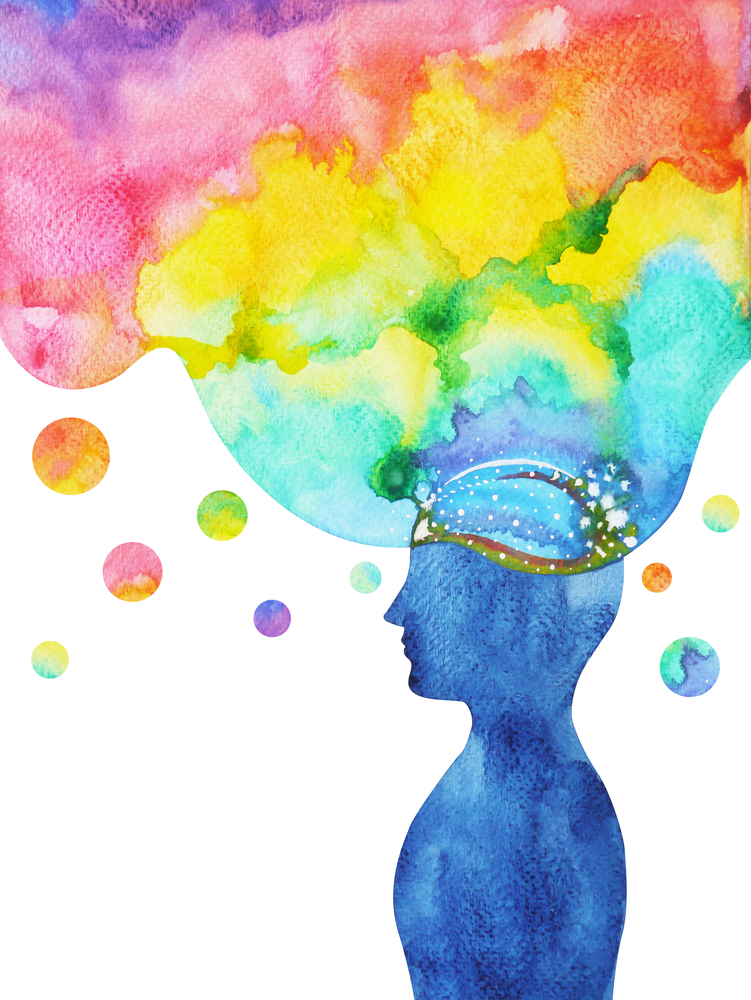
We may earn money from the companies or products mentioned in this post.
Mental Health Awareness month begins soon–May 1st, to be exact. Of course, the goal of such a campaign is to make more of a dialogue around the subject, and I think that this one is especially important because it’s a dialogue that we just don’t have often enough. For some reason, despite the great strides that have been made in mental health awareness, it’s still something that we tend to hush up around, suddenly get awkward about, or experience shame and isolation when we’re handling it ourselves.
 Related Content: 5 Ways to Battle Depression While Pregnant
Related Content: 5 Ways to Battle Depression While Pregnant
I know that I’m not going to change that with just one article, but I’d like to point out a different way of thinking about mental health. I think that we have a tendency to divide ourselves into categories: those dealing with it, and those who are looking from the outside, just trying to be more sympathetic.
Most People Experience Mental Illness at Some Point
The truth is that you’re almost definitely going to have to deal with a mental health issue at some point in your life. During one specific study and survey of mental health, it was found that 40% of people are dealing with mental illness within a five year period, and another 40% have had to deal with a major mental health challenge in the past. I think that it’s safe to say that if you include future challenges down the line for all those studied, 100% will have to deal with mental health challenges at some point. Sure, these challenges might never accelerate into the kind of thing that requires professional treatment, but they can still be incredibly debilitating. Worst of all, they can be incredibly isolating, when you believe you’re the only one feeling that way.
Think of Mental Health Like Physical Health
Comparing mental and physical health can help us get a more helpful perspective on mental health. For example…
-
- Everyone gets sick now and then.
-
- When you’re severely sick, you seek out a professional’s help.
-
- Sometimes you can cure the problem with medication, sometimes with lifestyle changes.
- Other times, you simply need to learn to manage the illness, since it will affect how you manage the rest of your life.
Everyone Can Improve Their Mental Health
Just as all of us could do more to support better physical health, I believe that we could all do more to care for our own mental health. After all, every year we make resolutions to eat better, and exercise more. What’s the mental health equivalent of that?
-
- Connection: Did you know that maintaining relationships and meeting new people actually keeps your brain young? The number of meaningful relationships we have also has a close correlation with mental health.
-
- Physical health: Mental health and physical health are closely related. Exercising and maintaining a good diet can greatly affect issues like anxiety and depression.
- Stress management: Stress is an inevitable part of life, and it’s not always a bad thing. Some of the most stressful events in life are also the best (marriage, having a child, getting a new job, etc.) For this reason, everyone needs to have coping mechanisms that they can utilize in order to healthily manage stress.
It’s also very important for people to learn to maintain their mental health when they’re young. Children and teens are dealing with anxiety and depression at a staggering rate right now. Some of this might be due to the changing demands of modern life. However, some may also be due to the fact that few children and teens are equipped with tools to handle these things in a healthy way. It’s important to recognize signs of depression and anxiety in your children and proactively teach them how to take care of their own mental health.
Most Common Mental Health Challenges
Some mental illnesses are hereditary, and usually manifest themselves in young adulthood. However, mental health challenges can also be triggered by periods of extreme stress in our life. For example, many women experience upsets in mental health during or after pregnancy. Trauma is also something that can trigger severe mental illness, and although childhood trauma usually has the most complex and long-lasting effects, trauma can happen at any period in our lives.
That being said, the majority of people will have to deal with one or more of the following problems:
-
- Depression: Depression is actually the #1 cause of disability in the world, and that number is ever-growing.
-
- Anxiety: Anxiety disorders come in many forms (including depression) and can include symptoms like social anxiety, panic attacks, phobias, etc. Anxiety is also something that commonly co-occurs with other disorders, like addiction or OCD.
- Addiction: Yes, addiction is a mental illness. Many people think that it’s just bad behavior, but addiction is professionally acknowledged and treated as a brain disease. Because of the confusion with blame and shame inherent in addiction, it can be especially difficult to maintain positive relationships. This link has a good guide for supporting someone struggling with addiction.
When a problem is really severe (whether it’s one of those above, or something else entirely,) it’s essential that we seek out professional help. Sometimes, that step relies on the care and concern of others. Especially in the case of depression, it’s hard for someone in the middle of it to have any hope of things getting better. Each of us needs to be aware of, and able to identify warning signs of life-threatening dangers; things like suicide, or elevated risk-taking behavior (which might manifest as high-risk sex, substance abuse,) and major changes in lifestyle and relationships.
Many resources are available to help raise awareness and make help available for individuals currently struggling with mental health issues. You can learn more about this month’s campaign here.



Thanks a lot! How do you cope with mental isolation?
Depression can be a severe condition that is , unfortunately, quite common. It is said that the APA ( American Psychological Association) states it is among the top prevalent mental disorder. This is due to an interaction of genetics, psychological, environmental, and biological causes. Depression can make you feel overwhelmed, depressed and disconnected. It can affect your day-to-day life, making daily tasks such as eating, sleeping, studying and working seem difficult. Like depression and anxiety disorders, the signs of depression could differ from one individual to individual.
Emily recently posted…The Science Behind Resveratrol Supplements and 6 Health Benefits
The brain is a major part of the human body, which is very important to work properly. Scientists and doctors say that there is 80% in the brain.truvada
The brain is a major part of the human body, which is very important to work properly. Scientists and doctors say that there is 80% in the brain https://www.growhousenutraceuticals.com/
The brain is a major part of the human body, which is very important to work properly. Scientists and doctors say that there is 80% in the brain Rupam Swedish Bitters
Mental Health Awareness Month is a great opportunity to break down the stigma around mental health and start a conversation about it. There are many things you can do to help raise awareness of mental health during Mental Health Awareness Mont.canadianinsulin.com
Depression can be a severe condition that is , unfortunately, quite common. It is said that the APA ( American Psychological Association) states it is among the top prevalent mental disorder. This is due to an interaction of genetics, psychological, environmental, and biological causes. Workout Blog
The brain is a major part of the human body, which is very important to work properly. Scientists and doctors say that there is 80% in the brain what is cord blood banking
Depression can be a severe condition that is , unfortunately, quite common. It is said that the APA ( American Psychological Association) states it is among the top prevalent mental disorder. This is due to an interaction of genetics, psychological, environmental, and biological causes Fitness and Gym Clothing for Women and Men
The brain is a major part of the human body, which is very important to work properly. Scientists and doctors say that there is 80% in the brain buy steroids with debit card us
Anxiety, a prevalent mental health issue, impacts countless lives. Recognized by the APA as a widespread disorder, its roots lie in genetic, psychological, environmental, and biological factors. Anxiety induces feelings of apprehension, dread, and isolation, creating a challenging emotional landscape for those affected. Mental Health & Substance Use Services Provider
Banishing the stigma of mental health requires education, empathy, and advocacy. By fostering open conversations, promoting understanding, and providing support, we can dismantle misconceptions and create a culture of acceptance and compassion, empowering individuals to seek help without fear or shame. heavymug.co
In addition to medical treatment, there are several home remedies that may provide relief from abdominal pain caused by coughing. These include staying hydrated, practicing relaxation techniques, using hot or cold packs, and avoiding triggers such as smoking or certain foods that can exacerbate symptoms. Pain in Lower Abdomen From Coughing